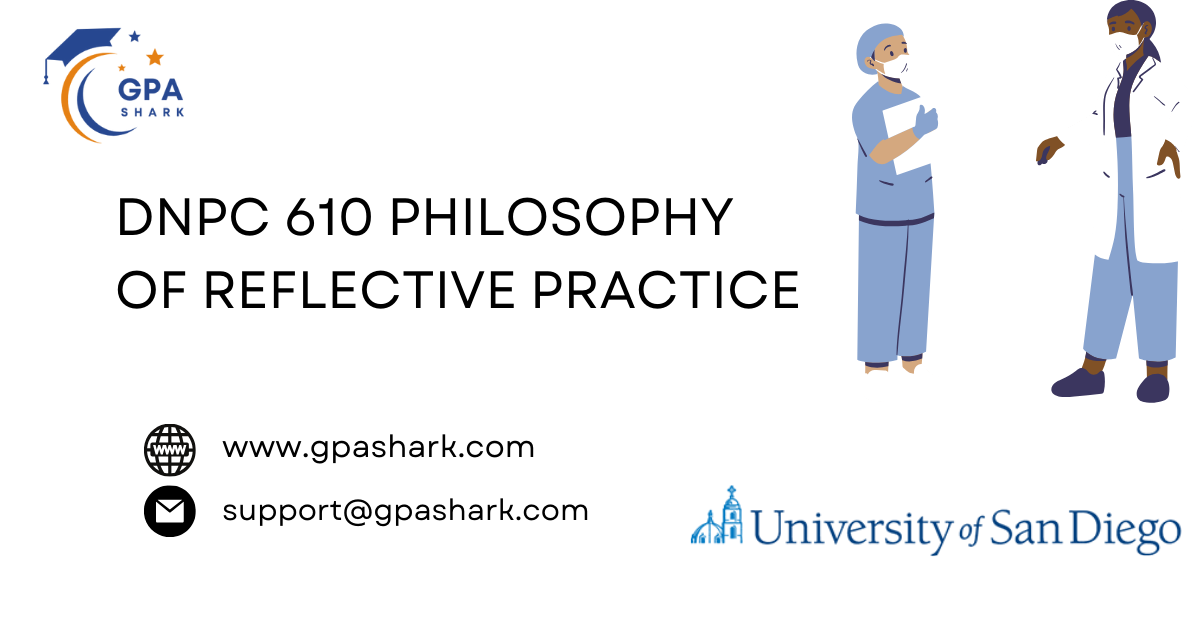The University of San Diego’s DNPC 610 Philosophy of Reflective Practice is a pivotal course within the Doctor of Nursing Practice (DNP) program. This 3-unit course is designed to provide students with a deep understanding of the philosophical foundations of advanced nursing practice and practice inquiry. Here’s an in-depth look at what this course entails and its significance in the DNP curriculum.
Table of Contents
DNPC 610 Philosophy of Reflective Practice Course Overview
DNPC 610 offers students the opportunity to delve into the philosophical underpinnings of advanced nursing practice. The course covers both the ontology and epistemology of reflective practice and introduces current perspectives on practice inquiry. By exploring these philosophical dimensions, students gain insights into how reflective practice can inform and be informed by inquiry, effectively bridging the gap between science and practice.
Key Components of DNPC 610 Philosophy of Reflective Practice
Philosophical Underpinnings
The course begins with an exploration of the philosophical underpinnings of advanced nursing practice. This includes studying the nature of being (ontology) and the nature of knowledge (epistemology) as they relate to reflective practice.
Reflective Practice
Reflective practice is a core focus of DNPC 610. Students learn how to critically reflect on their clinical experiences, decisions, and actions. This reflective process is essential for continuous learning and improvement in nursing practice.
Practice Inquiry Perspectives
The course examines current perspectives on practice inquiry, encouraging students to engage in scholarly inquiry that bridges theory and practice. This involves evaluating and integrating research findings into clinical practice to improve patient outcomes.
Methodologies and Philosophical Assumptions:
DNPC 610 Philosophy of Reflective Practice explores selected methodologies and their underlying philosophical assumptions. Understanding these methodologies helps students develop a reflective practice that is both informed by and informs inquiry, fostering a holistic approach to nursing care.
DNPC 610 Philosophy of Reflective Practice Course Objectives
The primary objectives of DNPC 610 are to:
- Enhance students’ understanding of the philosophical foundations of reflective practice.
- Equip students with the skills to critically reflect on their practice and integrate evidence-based knowledge.
- Foster a deeper appreciation of the relationship between science and practice in nursing.
Assessment and Completion
To successfully complete DNPC 610, students must achieve a letter grade of B- or higher. This ensures that they have a solid grasp of the course material and can apply reflective practice principles effectively in their clinical settings.
Importance of DNPC 610 Philosophy of Reflective Practice in the DNP Program
DNPC 610 is a crucial component of the DNP curriculum at the University of San Diego. It lays the foundation for advanced nursing practice by encouraging students to think deeply about their practice, engage in continuous learning, and contribute to the advancement of nursing science. By fostering a reflective and inquiry-driven approach, DNPC 610 prepares nurses to lead and innovate in their fields, ultimately improving healthcare delivery and patient outcomes.
In summary, DNPC 610: Philosophy of Reflective Practice is an essential course that provides DNP students with the philosophical and practical tools needed for advanced nursing practice. Through this course, students learn to bridge the gap between theory and practice, ensuring that their clinical decisions are informed by the latest research and reflective inquiry.
FAQs About DNPC 610: Philosophy of Reflective Practice
What is DNPC 610: Philosophy of Reflective Practice?
DNPC 610: Philosophy of Reflective Practice is a 3-unit course within the University of San Diego’s Doctor of Nursing Practice (DNP) program. The course explores the philosophical underpinnings of advanced nursing practice, including the ontology and epistemology of reflective practice and current practice inquiry perspectives. It also examines selected methodologies and their philosophical assumptions to develop a reflective practice that bridges science and practice.
What are the main topics covered in DNPC 610?
The main topics in DNPC 610 include:
Philosophical underpinnings of advanced nursing practice
Ontology and epistemology of reflective practice
Current perspectives on practice inquiry
Methodologies and their philosophical assumptions
Developing a reflective practice that informs and is informed by inquiry
What are the prerequisites for enrolling in DNPC 610?
There are no specific prerequisites mentioned for enrolling in DNPC 610, but it is part of the DNP curriculum, so students must be enrolled in the DNP program at the University of San Diego. Familiarity with basic concepts of nursing practice and inquiry will be beneficial.
How is DNPC 610 assessed?
To pass DNPC 610, students must achieve a letter grade of B- or higher. Assessment methods may include assignments, reflective journals, discussions, and projects that demonstrate an understanding of the philosophical foundations of reflective practice and the ability to apply these principles in clinical settings.
Where can I get help with DNPC 610 assignments?
For assistance with assignments in DNPC 610: Philosophy of Reflective Practice, you can seek professional help from GPAShark.com. They offer expert guidance to ensure your assignments meet academic standards and help you understand the course material more effectively.
Also Read:
- University of San Diego DNP Capstone Project Help
- DNPC 610 Philosophy of Reflective Practice
- DNPC 611 Methods of Translational Science/ Evidence Based Clinical Practice
- DNPC 625 Epidemiology: Foundations of Evidence-Based Practice
- DNPC 626 Strategic Planning and Quality Initiatives
- DNPC 648 Health Policy Analysis
- DNPC 660 Advanced Leadership and Financial Decision Making for Complex Systems Management
- DNPC 665 Consumer Health Informatics
- DNPC 686 Perspectives in Program Planning and Evaluation
- DNPC 630 DNP Scholarly Practice

